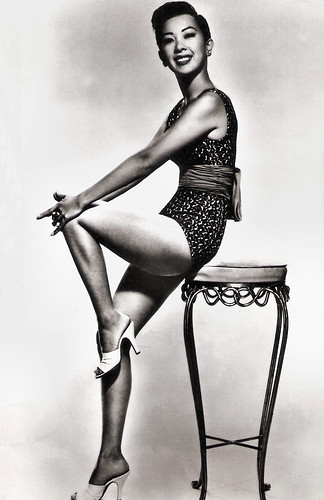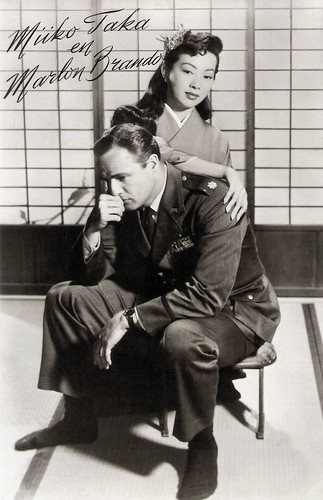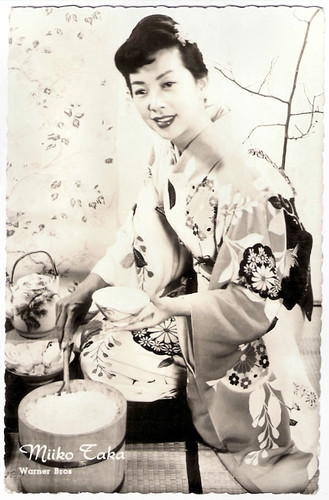Japanese American actress Miiko Taka (1925) is best known for co-starring with Marlon Brando in Sayonara (1957). She later also appeared in the British cinema.

Spanish postcard, no. 6330. Miiko Taka and Marlon Brando in Sayonara (Joshua Logan, 1957). Collection: Marlene Pilaete.

West German postcard by Franz Josef Rüdel, Filmpostkartenverlag, Hamburg-Bergedorf, no. 2324. Photo: Warner Bros. Publicity still for Sayonara (Joshua Logan, 1957).

Spanish postcard by Soberanas, no. 340.
Miiko Taka (高美以子) was born Betty Miiko Shikata in 1925 in Seattle, but she was raised in Los Angeles, California. Her parents had immigrated from Japan.
She is a Nisei, a Japanese-language term used in countries in North America and South America to specify the children born in the new country to Japanese-born immigrants (who are called Issei). In 1942, she was interned with her family at the Gila River War Relocation Center in Arizona.
After director Joshua Logan's first choice for the role of Hana-ogi, Audrey Hepburn, turned him down, he looked to cast an unknown actress in Sayonara (1957). Taka, who at the time was working as a clerk at a travel agency in Los Angeles, was discovered by a talent scout at a local Nisei festival.
Although she had no previous acting experience, Variety gave her a positive review: "Sayonara, based on the James A. Michener novel, is a picture of beauty and sensitivity. Amidst the tenderness and the tensions of a romantic drama, it puts across the notion that human relations transcend racial barriers. (...) Taka plays the proud Hana-ogi, the dedicated dancer, who starts by hating the Americans whom she sees as robbing Japan of its culture and ends up in Brando’s arms. Apart from being beautiful, she’s also a distinctive personality and her contribution rates high."
Nominated for ten Academy Awards, Sayonara won five, including Best Supporting Actor (Red Buttons) and Best Supporting Actress (Miyoshi Umeki). Warner Bros. gave Miiko Taka a term contract as a result of her performance in Sayonara.

Dutch postcard by Uitg. Takken, Utrecht, no. 3731. Photo: Warner Bros. Publicity still for Sayonara (Joshua Logan, 1957).

Dutch postcard by Uitgeverij Takken, Utrecht, no. 3734. Photo: Warner Bros. Publicity still for Sayonara (Joshua Logan, 1957) with Marlon Brando.

Dutch postcard. Photo: Warner Bros. Miiko Taka and Marlon Brando in Sayonara (Joshua Logan, 1957). Sent by mail in 1958.
After Sayonara, Miiko Taka worked in films with James Garner, Bob Hope, and Cary Grant. With Jeffrey Hunter and legendary American Japanese film star Sessue Hayakawa, she worked on the World War II film Hell to Eternity (Phil Karlson, 1960).
Her other films include Cry for Happy (George Marshall, 1961), in which she played a geisha opposite Glenn Ford, the comedy Walk, Don't Run (Charles Walters, 1966) starring Cary Grant, and the musical Lost Horizon (Charles Jarrott, 1973).
With Japanese star Toshiro Mifune, she appeared in the British film Paper Tiger (Ken Annakin, 1975) and the TV miniseries Shõgun (Jerry London, 1980). She also served as an interpreter for Mifune as well as director Akira Kurosawa when they visited Hollywood.
Miiko Taka married Dale Ishimoto in Baltimore in 1944, and they had one son, Greg Shikata, who works in the film industry, and one daughter. They divorced in 1958.
In 1963, she married Los Angeles TV news director Lennie Blondheim. Miiko Taka's last film to date was the American action film The Challenge (John Frankenheimer, 1982).

Dutch postcard, no. 29. Photo: Warner Bros. Publicity still for Sayonara (Joshua Logan, 1957).

Dutch postcard by Uitg. Takken, Utrecht, no. 3731. Photo: Warner Bros. Publicity still for Sayonara (Joshua Logan, 1957).
Sources: Variety, AllMovie, Wikipedia and IMDb.

Spanish postcard, no. 6330. Miiko Taka and Marlon Brando in Sayonara (Joshua Logan, 1957). Collection: Marlene Pilaete.

West German postcard by Franz Josef Rüdel, Filmpostkartenverlag, Hamburg-Bergedorf, no. 2324. Photo: Warner Bros. Publicity still for Sayonara (Joshua Logan, 1957).

Spanish postcard by Soberanas, no. 340.
Replacing Audrey Hepburn
Miiko Taka (高美以子) was born Betty Miiko Shikata in 1925 in Seattle, but she was raised in Los Angeles, California. Her parents had immigrated from Japan.
She is a Nisei, a Japanese-language term used in countries in North America and South America to specify the children born in the new country to Japanese-born immigrants (who are called Issei). In 1942, she was interned with her family at the Gila River War Relocation Center in Arizona.
After director Joshua Logan's first choice for the role of Hana-ogi, Audrey Hepburn, turned him down, he looked to cast an unknown actress in Sayonara (1957). Taka, who at the time was working as a clerk at a travel agency in Los Angeles, was discovered by a talent scout at a local Nisei festival.
Although she had no previous acting experience, Variety gave her a positive review: "Sayonara, based on the James A. Michener novel, is a picture of beauty and sensitivity. Amidst the tenderness and the tensions of a romantic drama, it puts across the notion that human relations transcend racial barriers. (...) Taka plays the proud Hana-ogi, the dedicated dancer, who starts by hating the Americans whom she sees as robbing Japan of its culture and ends up in Brando’s arms. Apart from being beautiful, she’s also a distinctive personality and her contribution rates high."
Nominated for ten Academy Awards, Sayonara won five, including Best Supporting Actor (Red Buttons) and Best Supporting Actress (Miyoshi Umeki). Warner Bros. gave Miiko Taka a term contract as a result of her performance in Sayonara.

Dutch postcard by Uitg. Takken, Utrecht, no. 3731. Photo: Warner Bros. Publicity still for Sayonara (Joshua Logan, 1957).

Dutch postcard by Uitgeverij Takken, Utrecht, no. 3734. Photo: Warner Bros. Publicity still for Sayonara (Joshua Logan, 1957) with Marlon Brando.

Dutch postcard. Photo: Warner Bros. Miiko Taka and Marlon Brando in Sayonara (Joshua Logan, 1957). Sent by mail in 1958.
Toshiro Mifune
After Sayonara, Miiko Taka worked in films with James Garner, Bob Hope, and Cary Grant. With Jeffrey Hunter and legendary American Japanese film star Sessue Hayakawa, she worked on the World War II film Hell to Eternity (Phil Karlson, 1960).
Her other films include Cry for Happy (George Marshall, 1961), in which she played a geisha opposite Glenn Ford, the comedy Walk, Don't Run (Charles Walters, 1966) starring Cary Grant, and the musical Lost Horizon (Charles Jarrott, 1973).
With Japanese star Toshiro Mifune, she appeared in the British film Paper Tiger (Ken Annakin, 1975) and the TV miniseries Shõgun (Jerry London, 1980). She also served as an interpreter for Mifune as well as director Akira Kurosawa when they visited Hollywood.
Miiko Taka married Dale Ishimoto in Baltimore in 1944, and they had one son, Greg Shikata, who works in the film industry, and one daughter. They divorced in 1958.
In 1963, she married Los Angeles TV news director Lennie Blondheim. Miiko Taka's last film to date was the American action film The Challenge (John Frankenheimer, 1982).

Dutch postcard, no. 29. Photo: Warner Bros. Publicity still for Sayonara (Joshua Logan, 1957).

Dutch postcard by Uitg. Takken, Utrecht, no. 3731. Photo: Warner Bros. Publicity still for Sayonara (Joshua Logan, 1957).
Sources: Variety, AllMovie, Wikipedia and IMDb.
No comments:
Post a Comment